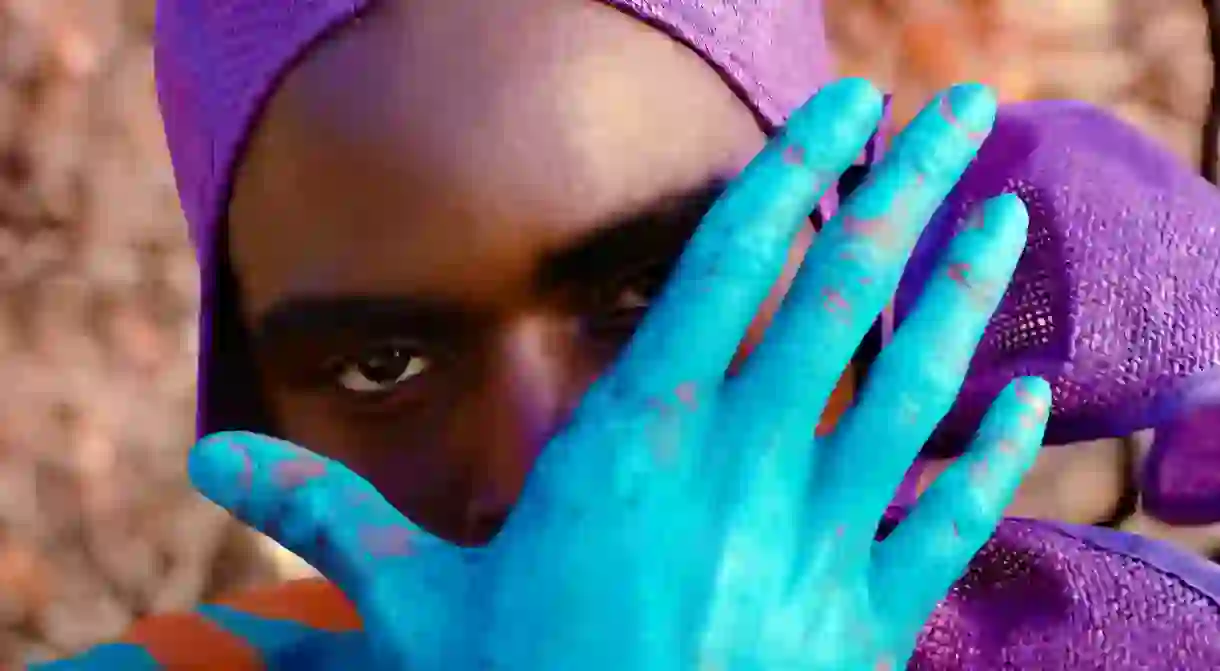Adebayo Oke-Lawal Uses Fashion To Fight Toxic Masculinity in Nigeria

Can fashion change society? Designer Adebayo Oke-Lawal is doing just that with his androgynous brand, Orange Culture, which challenges traditional views of masculinity in Nigeria.
Lagos-based fashion designer Adebayo Oke-Lawal, founder of Orange Culture, always wanted to be free to express himself however he chose to. His work is dedicated to pushing back against the toxic masculinity he experienced while growing up. And his positive message, born from adversity in his early years, is getting through.
“I went to an all-boys school and experienced a lot of aggravation because of how I represented myself,” he told the crowd at Design Indaba 2019, a Cape Town festival celebrating design and creativity. “People told me I was too soft; I needed to be harder to be a man.”

These experiences made him think about masculinity as a sense of individuality. “Whatever society wanted me to be wasn’t what I had to be,” he says. From the age of 15, Oke-Lawal started doing fashion internships alongside a job in a bank – his parents’ preferred profession. At just 20 years old, he launched his brand, Orange Culture, with money saved from his bank job. “My first collection got the worst reviews ever,” he says. “Someone said I should kill myself for showing a man wearing a red suit! But I also got a DM from a person who said my brand really inspired them.”

It wasn’t just changing people’s minds about what kind of clothes men can and can’t wear that was a challenge; Oke-Lawal also had to build a fashion company from scratch. He wanted it to be a local company that would benefit the people of Lagos and Nigeria.
“It was insane, starting off and trying to produce collections, because in terms of infrastructure we are set back compared to lots of other countries. We don’t have the fashion schools or the technology; we don’t have a lot of the things that people have when they’re producing in China,” he explains. Nine years later, he has taught a team of tailors and other staff and is seeing a change. “Now people are training other people. They’re learning, the company is expanding and the fashion industry in Nigeria is developing. The generations before us weren’t as open to the idea of developing the creative arts,” he says. “It’s important that people can see fashion production in Nigeria.”

Almost a decade since the launch of Orange Culture, the conversation about masculinity in Nigeria is moving in the right direction, Oke-Lawal says. “I find that people are questioning things more and because of that they’re learning, whereas before the attitude was, ‘This is what exists and I’ll take it as it is.’ The way men are dressing now, exploring colours, suits, fits, shapes; even the fact that there are so many brands having conversations about who we are as people shows the progression in Nigeria. It excites me every time I see it.”

Oke-Lawal is seeing the older generation become more open-minded, too. “Last year my dad called me and said, ‘Tell me about what you’re doing, let me help you with your factory, let me give you some advice.’ It was such an emotional experience for me, watching someone who had been so against my career come to terms with it and say, ‘This is relevant’– that really touched me,” Oke-Lawal says.

Today, the designer finds inspiration in the world around him, both on his travels and at home. “I’m inspired by emotional intelligence and the lack thereof, and by the state of Nigeria in terms of politics and the way it’s suppressing self-expression – I think that’s a huge part of why we need to use art as a tool for social change,” he explains. “How can a whole political frame be telling people that they shouldn’t speak, they shouldn’t tweet about their government, they shouldn’t marry who they want to marry? These are decisions for us to make for ourselves, not for you to make for us.”

Change is underway, though, and it’s the younger generation that’s leading the charge in Lagos. “People have chosen to export from Lagos and build from within it in a way that we’ve never seen before,” Oke-Lawal says. “They’re opening up restaurants and brands and presenting music inspired by Lagos in fresh ways. I think that’s such an exciting thing, because Lagos is now so diverse.”














